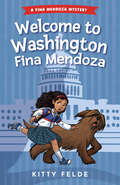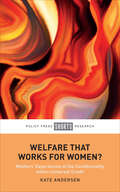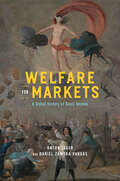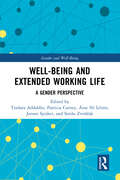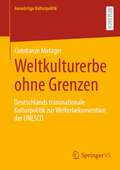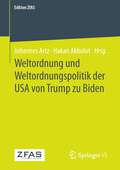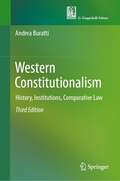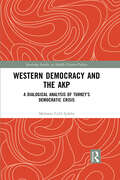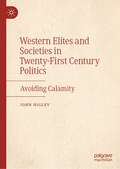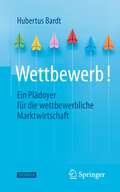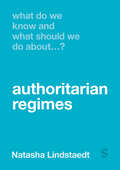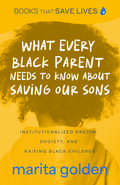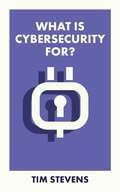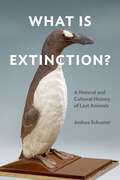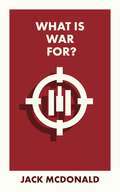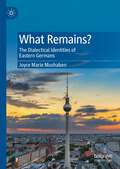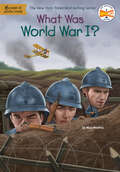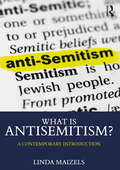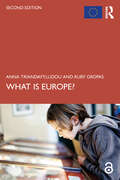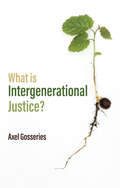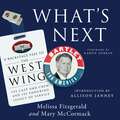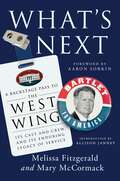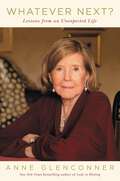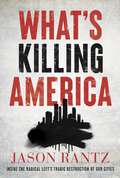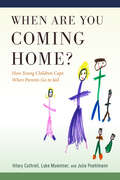- Table View
- List View
Welcome to Washington Fina Mendoza: A Fina Mendoza Mystery (The Fina Mendoza Mysteries #1)
by Kitty FeldeA lively mystery with a touch of spookiness, an intriguing setting, an appealing family dynamic, and an enterprising Latina heroine. – Kirkus ReviewsBeware the Demon Cat of Capitol Hill!Legends say if you see the Demon Cat of Capitol Hill, you're cursed with bad luck. Ten-year-old Fina Mendoza just saw it. And the last thing her family needs right now is a jinx!Fina and her older sister Gabby just moved to Washington, D.C. after the death of their mom to live with Papa, a congressman from California. But then she comes face-to-whiskers with a mysterious cat in the Capitol Crypt. Is it the Demon Cat?Disasters follow! Jars of spaghetti sauce explode. Fina's beloved grandmother Abuelita breaks her leg. And Fina's only friend in Washington, a big orange dog named Senator Something, becomes the next target.The only way for Fina to save her family from future "cat"astrophe is to solve the mystery of the Demon Cat of Capitol Hill.This Readers' Favorite Award-winning novel is more than a mystery story!Fina takes us backstage at the U.S. Capitol to see firsthand how government works with an emphasis on Congress and the Legislative Branch. The Fina Mendoza Mysteries provide an introduction to civics for elementary age children.The West Wing meets Nancy Drew...For fans of Nancy Drew Mysteries, Boxcar Children, Encyclopedia Brown, and Hardy Boys!THE FINA MENDOZA MYSTERIES SERIES: Book 1 – Welcome to Washington Fina Mendoza Book 2 – State of the Union Book 3 – Snake in the Grass (coming soon)ALSO AVAILABLE IN SPANISH: Book 1 – Bienvenida a Washington Fina Mendoza Book 2 – Estado de la UniÓn Book 3 – Serpiente en la Hierba (muy pronto)ADDITIONAL EDUCATIONAL RESOURCES: – Perfect for classroom or homeschooling settings – Free podcast based on the books and current events: The Fina Mendoza Mysteries – 32-page Teacher's Guide including language arts, math, and social studies lessons
Welfare That Works for Women?: Mothers’ Experiences of the Conditionality within Universal Credit
by Kate AndersenFor generations, women have experienced disadvantage in the social security system. This book analyses fresh empirical evidence which demonstrates the gendered impacts of the new conditionality regime within Universal Credit. It shows how the regime affects women's unpaid caring roles, their position in the paid labour market and their agency regarding engagement in unpaid care and paid work. Ultimately, it highlights the impacts on the position of low-income women in the UK’s social security system and society. Drawing on in-depth interviews with mothers, this book offers a compelling narrative and crucial policy recommendations to improve the gendered impact of Universal Credit and make the social citizenship framework in the UK more inclusive of women.
Welfare for Markets: A Global History of Basic Income (The Life of Ideas)
by Anton JägerA sweeping intellectual history of the welfare state’s policy-in-waiting. The idea of a government paying its citizens to keep them out of poverty—now known as basic income—is hardly new. Often dated as far back as ancient Rome, basic income’s modern conception truly emerged in the late nineteenth century. Yet as one of today’s most controversial proposals, it draws supporters from across the political spectrum.In this eye-opening work, Anton Jäger and Daniel Zamora Vargas trace basic income from its rise in American and British policy debates following periods of economic tumult to its modern relationship with technopopulist figures in Silicon Valley. They chronicle how the idea first arose in the United States and Europe as a market-friendly alternative to the postwar welfare state and how interest in the policy has grown in the wake of the 2008 credit crisis and COVID-19 crash.An incisive, comprehensive history, Welfare for Markets tells the story of how a fringe idea conceived in economics seminars went global, revealing the most significant shift in political culture since the end of the Cold War.
Well-Being and Extended Working Life: A Gender Perspective (Gender and Well-Being)
by Tindara Addabbo Siniša Zrinščak Áine Ní Léime Patricia Carney Jeroen SpijkerMost European countries have experienced labour market reforms at varying times leading to extended working life and a postponement of retirement age. This book provides a gender perspective on the impact of extended working life on the different dimensions of well-being, the factors which can limit extended working life, and the working conditions of older workers.Over the course of 11 chapters the book explores factors that can limit access to paid work or affect working conditions for older workers, including care for dependent individuals, negative stereotypes surrounding aged workers and poor health. It also investigates differences in working conditions for older workers by gender compared to other groups of workers and across European countries including case-studies from Austria, France, Spain, Poland, Croatia, Albania and Turkey. It will be of interest to all scholars and students of social policy, sociology, gender studies and labour studies more broadly.
Weltkulturerbe ohne Grenzen: Deutschlands transnationale Kulturpolitik zur Welterbekonvention der UNESCO (Auswärtige Kulturpolitik)
by Constanze MetzgerForderungen an eine deutsche Auswärtige Kulturpolitik, die sich nicht mehr an nationalstaatlichen Interessen, sondern an geteilter Verantwortung orientiert, sind allgegenwärtig. In diesem Kontext leistet die hier vorgestellte Untersuchung einen wissenschaftlichen Beitrag zur Auswärtigen Kulturpolitik in der Welterbekonvention. Constanze Metzger analysiert die außenkulturpolitische Entwicklung Deutschlands in der UNESCO bis 1972 – dem Jahr, in dem die Welterbekonvention verabschiedet wurde. Sie evaluiert Wechselwirkungen zwischen nationalstaatlichen Interessen und transnationalen Zielen in der Konvention und verdeutlicht Interdependenzen von Politik und Kultur, die sowohl Konfliktpotentiale als auch Kooperationsmöglichkeiten zum Kulturerbeschutz bieten. Auf diesen Erkenntnissen aufbauend wird die praktische Umsetzung transnationaler und grenzüberschreitender Welterbestätten am Beispiel des deutsch-polnischen Muskauer Parks untersucht. Die Autorin beantwortet die Frage, ob hier das Nationale aufgelöst und dadurch Weltkulturerbe ohne Grenzen geschützt wird. Daraus resultierend schlägt die Autorin Desiderata einer transnationalen Auswärtigen Kulturpolitik vor.
Weltordnung und Weltordnungspolitik der USA von Trump zu Biden (Edition ZfAS)
by Hakan Akbulut Johannes Artz„America is back“, kündigte Joe Biden in seiner ersten Grundsatzrede zur US-amerikanischen Außenpolitik kurz nach seinem Einzug in das Weiße Haus an und bekannte sich zur Führungsrolle der USA auf der Weltbühne. Gerade diese Führungsrolle war von seinem Amtsvorgänger Donald J. Trump zurückgewiesen worden, der zudem einen antiliberalen Kurs im Inneren wie Äußeren verfolgt und somit die Krise der internationalen Ordnung verschärft hatte. Etwa zwei Jahre nach der Amtsübernahme Bidens nimmt diese Ausgabe der Edition ZfAS die Weltordnungspolitik seiner Administration unter die Lupe und untersucht, ob und wie sich die Weltordnungspolitik der USA von Trump zu Biden verändert hat, was den Revisionismus von Russland und China begründet und wie es um die internationale Ordnung und ihre Zukunft bestellt ist. Die Analysen fokussieren dabei sowohl auf die systemische als auch die subsystemische Ebene, tragen politischen, wirtschaftlichen wie normativen Einflussfaktoren Rechnung und haben globale wie regionale Herausforderungen zum Gegenstand.
Western Constitutionalism: History, Institutions, Comparative Law
by Andrea BurattiThis book explores the theoretical origins, historical foundation, political meaning, and legal development of western constitutionalism, as well as the structure and transformation of constitutional law in the Western World. Introducing the historical background of western constitutional traditions, it links this rich, conceptual framework with the legal arrangements of states’ constitutions and the current trends of the internationalization of constitutional law. Serving as a comprehensive introduction to constitutional studies, this book provides detailed information on the design of legal systems, while addressing the main critical, theoretical issues raised by constitutionalism in western democracies and in the global landscape. This new, third edition covers a broader scope, reflecting recent political and legal transformations, and is enriched in terms of didactic instruments for university students.
Western Democracy and the AKP: A Dialogical Analysis of Turkey’s Democratic Crisis (Routledge Studies in Middle Eastern Politics)
by Mehmet Celil ÇelebiUpturning the typical view of Turkey’s democratic trajectory as a product of authoritarian assault or unfortunate circumstances, this book argues that the AKP, first elected in 2002, has consistently advanced a narrative of democracy as the work of an elite working for the 'National Will'. Beginning with an analysis of the historical processes that led to the AKP’s rise at the beginning of the 21st century, the book then focuses on the AKP since 2002. Though Turkey’s democratic transition was originally characterised by Western co-operation, the author outlines the gradual deterioration of these relations since the 2010s, as well as the decline of political rights, freedom of expression and the rule of law. However, bringing in theoretical perspectives of democracy, it is argued that the AKP has adopted an alternative definition based on the 'National Will' throughout its rule, resistant to the Western essentialist view. As such, the AKP’s story highlights that the root of this crisis lies within democracy itself. The book will appeal to historians and analysts of Turkish politics, as well as to political scientists interested in theories of democracy. Moreover, for those interested in the global contemporary crisis of democracy, the book provides an important case-study.
Western Elites and Societies in Twenty-First Century Politics: Avoiding Calamity
by John HigleyThis book focuses on threats to the continued viability of Western institutions and practices for which it is not easy to conceive remedies consistent with the Western tradition. Higley argues that structural difficulties in postindustrial societies, particularly the United States, the United Kingdom, France, and elsewhere, threatened troubles that political manipulation by elites might not be sufficient to contain or resolve. Struggling against lethal climate change, politically explosive waves of migrants and refugees, the likelihood of further pandemics, populist nationalism, and destabilizing effects of social media, elites must consider new demographic, economic, social, political, and international policies. Higley offers a powerful and provocative analysis of the elite’s ability to sustain Western societies in their current social and political forms.
Wettbewerb!: Ein Plädoyer für die wettbewerbliche Marktwirtschaft
by Hubertus BardtWettbewerb ist eine zentrale Grundlage der Sozialen Marktwirtschaft in Deutschland. Aber er ist eine ungeliebte und vielfach abgelehnte Basis unseres Wohlstands. Druck, Konkurrenz und Anpassungszwang machen Wettbewerb unangenehm und manchmal schmerzhaft. Vom Globalisierungskritiker bis zum Monopolunternehmer hat er viele Gegner. Dabei bringt Wettbewerb an vielen Stellen Nutzen: Mehr Effizienz, mehr Innovationen, hohe Kundenorientierung und effizienter Umgang mit Ressourcen gehören dazu.Dieses Buch ist ein Plädoyer für Wettbewerb, der durch das Recht geschützt werden muss und zugleich klare Spielregeln und unparteiische Schiedsrichter braucht, damit das Wohlstandsversprechen der Sozialen Marktwirtschaft eingelöst werden kann. Im der aufkommenden Systemkonkurrenz mit autokratischen und staatskapitalistischen Systemen ist der Wettbewerb eine große Stärke der freiheitlichen und marktwirtschaftlichen Demokratien.
What Do We Know and What Should We Do About Authoritarian Regimes? (What Do We Know and What Should We Do About:)
by Natasha LindstaedtAt least 70% of the world’s population now lives under an autocracy. There are more openly authoritarian states than ever, democratic regimes are ‘backsliding’ into autocracy, and authoritarian values and practices are increasingly normalized. Regimes in China and Russia are as prominent and urgent as ever, but authoritarianism is spreading across the globe. Why is this happening? What can we do about it? This book is a concise and compelling exploration of the increasing number and influence of authoritarian regimes. It explains the realities of recent trends to ‘autocratisation’, the tools these regimes use, what we can do to resist, and why we might even allow ourselves a degree of optimism. Professor Natasha Lindstaedt works at the Department of Government at the University of Essex. Written by leading social scientists, the What Do We Know and What Should We Do About...? series offers concise, up-to-date overviews of issues often oversimplified, misrepresented or misunderstood and shows you how to enact change. "Short, sharp and compelling." - Alex Preston, The Observer "If you want to learn a lot about what matters most, in as short a time as possible, this is the series for you."- Danny Dorling, 1971 Professor of Geography, University of Oxford
What Every Black Parent Needs to Know About Saving Our Sons: Institutionalized Racism, Society, and Raising Black Children (Books That Save Lives)
by Marita GoldenEmpower Your Sons Against Institutionalized Racism“One of the most important pieces of literature for Black parents.”—MJ Fievre, author of Raising Confident Black KidsA powerful guide to navigate the challenges of raising families in turbulent times. In What Every Black Parent Needs to Know about Saving Our Sons, gain profound advice on how to protect and nurture Black teen boys.Essential knowledge, practical guidance. With intimate storytelling of her own son’s story and in-depth research against the chilling backdrop of racially motivated brutality, acclaimed author Marita Golden reveals alarming statistics and systemic issues affecting children of color—and remedies.A powerful and timely resource, What Every Black Parent Needs to Know about Saving Our Sons addresses pressing issues of today with new material and updated resources. Wisdom from psychologists, writers, and young Black men initiates meaningful discussions and delves into the complexities of Black parenting. Tackle topics such as generational trauma, being Black in white spaces, institutionalized racism, gun violence and how to not get shot, supporting mental health for black men, and other problems Black kids face. Embark on a transformative journey towards raising confident, successful, and resilient kids.Inside, find:Realities faced by Black families and the importance of teaching kids about racismGuidance to navigate, discuss, and explore the impact of fearing the black bodyConversations and strategies to keep our kids safe and growing up greatIf you liked The Light We Carry, Decoding Boys, Three Mothers, or American Carnage, you’ll love What Every Black Parent Needs to Know about Saving Our Sons.
What Is Cybersecurity For? (What Is It For?)
by Tim StevensHow will protecting our digital infrastructure shape our future? Cybersecurity is one of the key practical and political challenges of our time. It is at the heart of how modern societies survive and thrive, yet public understanding is still rudimentary: media portrayals of hoodie-wearing hackers accessing the Pentagon don’t convey its complexity or significance to contemporary life. This book addresses this gap, showing that the political dimension is as important as the technological one. It accessibly explains the complexities of global information systems, the challenges of providing security to users, societies, states and the international system, and the multitude of competing players and ambitions in this arena. Making the case for understanding it not only as a technical project, but as a crucial political one that links competing visions of what cybersecurity is for, it tackles the ultimate question: how can we do it better?
What Is Extinction?: A Natural and Cultural History of Last Animals
by Joshua SchusterWINNER, 25th ANNUAL SUSANNE M. GLASSCOCK BOOK PRIZELife on Earth is facing a mass extinction event of our own making. Human activity is changing the biology and the meaning of extinction. What Is Extinction? examines several key moments that have come to define the terms of extinction over the past two centuries, exploring instances of animal and human finitude and the cultural forms used to document and interpret these events.Offering a critical theory for the critically endangered, Joshua Schuster proposes that different discourses of limits and lastness appear in specific extinction events over time as a response to changing attitudes toward species frailty. Understanding these extinction events also involves examining what happens when the conceptual and cultural forms used to account for species finitude are pressed to their limits as well. Schuster provides close readings of several case studies of extinction that bring together environmental humanities and multispecies methods with media-specific analyses at the terminus of life.What Is Extinction? delves into the development of last animal photography, the anthropological and psychoanalytic fascination with human origins and ends, the invention of new literary genres of last fictions, the rise of new extreme biopolitics in the Third Reich that attempted to change the meaning of extinction, and the current pursuit of de-extinction technologies. Schuster offers timely interpretations of how definitions and visions of extinction have changed in the past and continue to change in the present.
What Is War For?
by Jack McDonaldHow does armed conflict shape global politics? And, critically, can it ever be regulated, a necessary first step to achieving a more peaceful world? This book examines the factors that define and shape war in the contemporary world, and how changes to technology and society are transforming warfare. Focusing on efforts to regulate and eliminate war, it provides a guide to the complex problems it poses now – and threatens in the future.
What Remains?: The Dialectical Identities of Eastern Germans
by Joyce Marie MushabenThis book tells the story of the German Democratic Republic from “the inside out,” using the lens of generational change to deconstruct an intriguing array of social identities that had little to do with the “official GDR” version authoritarian rulers regularly sought to impose on their citizens. The author compares the “identities” of five societal subgroups (GDR writers and intellectuals; pastors and dissidents; women; youth; and working-class men), exploring the policies defining their lives and status before/during/after the 1989 Wende, as well as the diverging “exit, voice and loyalty” dilemmas encountered by each. The “dialectical” components treated in this work center on the extent to which eastern identities were lost, found and reconfigured across three generations, from 1949 to 1989, from 1990 to 2005, then up to 2020. It explores how the existence of a separate East German state and the socialization processes imposed on each subculture has not only complicated the search for national unity since 1990 but also -- perhaps more controversially—invoked new challenges directly related to ongoing East-West structural disparities since unification and the treatment of eastern Germans by often more privileged western Germans.
What Was World War I? (What Was?)
by Nico Medina Who HQThis compelling addition to the What Was? series covers what was supposed to be &“the war to end all wars&” but tragically wasn't.In 1914, the assassination of an Austrian archduke set off a disastrous four-year-long conflict involving dozens of countries with battles taking place in all parts of the world. World War I was the first to use planes and tanks as well as deadly gases that left soldiers blinded or &“shell shocked&” (a condition now called Post Traumatic Stress Syndrome). There were battles that lasted for months with opposing troops fighting from rat-infested trenches, battles that often ended in a hollow victory with only a small area of land retaken. The author of many successful Who HQ titles Nico Medina gives young readers a clear and compelling account of this long and tragic event, a war that left over 20 million dead and was the lead-up to World War II barely twenty years later.
What is Antisemitism?: A Contemporary Introduction (What is this thing called Religion?)
by Linda MaizelsIn October 2018, a white supremacist murdered eleven Jewish worshipers and wounded six others at the Tree of Life Synagogue in Pittsburgh, Pennsylvania, the deadliest attack on Jews ever perpetrated in the United States. The gunman’s motivation to kill Jews stemmed from his belief that Jews were committing "genocide" against white Americans. Although his animosity was motivated by a racial conception of Jews, the attack took place in a house of worship, illustrating the complex and interlocking web of anti-Jewish hatred based on race, ethnicity, nationality, religion, economic issues, and conspiracy theory that is commonly referred to as "antisemitism." What is Antisemitism? provides a detailed overview of this complex topic. It offers a history of anti-Jewish animosity from antiquity to the present; a discussion of the difficulties of defining antisemitism - arguably one of the most contentious issues in the contemporary discourse on the subject – and three case studies illustrating the diverse and wide-ranging nature of the phenomenon in the present-day, including examples from the political far right, the political hard left, and radical Islamism. With suggestions for further reading, and a chronological structure, this volume is an accessible and essential student textbook.
What is Europe?
by Anna Triandafyllidou Ruby GropasThis authoritative yet accessible introduction to understanding Europe today moves beyond accounts of European integration to provide a wide-ranging and nuanced study of contemporary Europe and its historical development. This fully updated edition adds material on recent developments, such as Brexit and the migrant and Eurozone crises. The concept of Europe is instilled with a plethora of social, cultural, economic, and political meanings. Throughout history, and still today, scholars writing on Europe, and politicians involved in national or European politics, often disagree on the geographic limits of this space and the defining elements of Europe. Europe is, therefore, first and foremost a concept that takes different shapes and meanings depending on the realm of life on which it is applied and on the historical period under investigation. At a given point in time, depending on the perspective we adopt and the situation in which we find ourselves, Europe may represent very different things. Thus, we should better talk about ‘Europes’ in plural. What is Europe? explores these evolving conceptions of Europe from antiquity to the present. This book is all the more timely as Europe responds to the Russian invasion of Ukraine and Britain’s departure from the European Union, financial slump, refugee emergencies, and the COVID-19 pandemic. This book offers a fully updated introduction to European studies from an interdisciplinary perspective. It is a crucial companion to any undergraduate or graduate course on Europe and the European Union. The Open Access version of this book, available at www.taylorfrancis.com, has been made available under a Creative Commons Attribution-Non Commercial-No Derivatives 4.0 license.
What is Intergenerational Justice?
by Axel GosseriesCan people alive now have duties to future generations, the unborn millions? If so, what do we owe them? What does “justice” mean in an intergenerational context, both between people who will coexist at some point, and between generations that will never overlap? In this book, Axel Gosseries provides a forensic examination of these issues, comparing and analyzing various views about what we owe our successors. He discusses links between justice and sustainability, and looks at the implications of the fact that our successors’ preferences are heavily influenced by what we will actually leave them and by the education they receive. He also points to how these theoretical considerations apply to real-life issues, ranging from pension reform and Brexit to biodiversity and the climate crisis. He ends by outlining how intergenerational considerations may translate into institutional design. Anyone grappling with the dilemmas of our obligations to the future, from students and scholars to policy makers and active citizens, will find this an invaluable theoretical and practical guide to this moral and political minefield.
What's Next: A Backstage Pass to The West Wing, Its Cast and Crew, and Its Enduring Legacy of Service
by Mary McCormack Melissa Fitzgerald"This is the book The West Wing deserves." Allison Janney"A joy and a MUST READ for all the Wingnuts out there!" Brad WhitfordA behind-the-scenes look into the creation and legacy of The West Wing as told by cast members Melissa Fitzgerald and Mary McCormack, with compelling insights from cast and crew exploring what made the show what it was and how its impassioned commitment to service has made the series and relationships behind it endure. Includes an exclusive foreword by showrunner Aaron Sorkin and introduction by cast member Allison Janney.Step back inside the world of President Jed Bartlet's Oval Office with Fitzgerald and McCormack as they reunite the West Wing cast and crew in a lively and colourful "backstage pass" to the timeless series. This intimate, in-depth reflection reveals how The West Wing was conceived, and spotlights the army of people it took to produce it, the lifelong friendships it forged, and the service it inspired.From cast member origin stories to the collective cathartic farewell on the show's final night of filming, What's Next will delight readers with on-set and off-camera anecdotes that even West Wing super fans have never heard. Meanwhile, a deeper analysis of the show's legacy through American culture, service, government, and civic life underscores how the series envisaged an American politics of decency and honour, creating an aspirational White House beyond the bounds of fictional television. What's Next revisits beloved episodes with fresh, untold commentary; compiles poignant and hilarious stories from the show's production; highlights initiatives supported by the cast, crew, and creators; and makes a powerful case for competent, empathetic leadership, hope, and optimism for whatever lies ahead."What's Next is the highest level of access you can get to The West Wing without a background check." Josh Malina"What's Next is the book we all need right now." Dulé Hill"Any West Wing fan will adore this book, as will anyone who admires brilliant television and all that it takes to make it. Run and buy What's Next for all the West Wingers in your life!" Janel Moloney
What's Next: A Backstage Pass to The West Wing, Its Cast and Crew, and Its Enduring Legacy of Service
by Mary McCormack Melissa Fitzgerald"This is the book The West Wing deserves." Allison Janney"A joy and a MUST READ for all the Wingnuts out there!" Brad WhitfordA behind-the-scenes look into the creation and legacy of The West Wing as told by cast members Melissa Fitzgerald and Mary McCormack, with compelling insights from cast and crew exploring what made the show what it was and how its impassioned commitment to service has made the series and relationships behind it endure. Includes an exclusive foreword by showrunner Aaron Sorkin and introduction by cast member Allison Janney.Step back inside the world of President Jed Bartlet's Oval Office with Fitzgerald and McCormack as they reunite the West Wing cast and crew in a lively and colourful "backstage pass" to the timeless series. This intimate, in-depth reflection reveals how The West Wing was conceived, and spotlights the army of people it took to produce it, the lifelong friendships it forged, and the service it inspired.From cast member origin stories to the collective cathartic farewell on the show's final night of filming, What's Next will delight readers with on-set and off-camera anecdotes that even West Wing super fans have never heard. Meanwhile, a deeper analysis of the show's legacy through American culture, service, government, and civic life underscores how the series envisaged an American politics of decency and honour, creating an aspirational White House beyond the bounds of fictional television. What's Next revisits beloved episodes with fresh, untold commentary; compiles poignant and hilarious stories from the show's production; highlights initiatives supported by the cast, crew, and creators; and makes a powerful case for competent, empathetic leadership, hope, and optimism for whatever lies ahead."What's Next is the highest level of access you can get to The West Wing without a background check." Josh Malina"What's Next is the book we all need right now." Dulé Hill"Any West Wing fan will adore this book, as will anyone who admires brilliant television and all that it takes to make it. Run and buy What's Next for all the West Wingers in your life!" Janel Moloney
Whatever Next?: Lessons from an Unexpected Life
by Anne Glenconner**Instant Sunday Times Bestseller** Bracing honesty, rare insight, and more revelations: the New York Times bestselling author of Lady in Waiting shares everything she's learned from her extraordinary and unexpected life.Lady in Waiting brought us royal magic, beguiling insight, and jaw-dropping stories from life inside Anne Glenconner&’s privileged circle, which though golden didn't always glitter. As she revealed in her memoir, it has been one of stark contrasts—from growing up in the splendor of Holkham Hall to living in a tent in the jungle of Mustique, from traveling the world with Princess Margaret to coping with her wildly unpredictable husband Lord Glenconner. She has also survived the tragic loss of two of her sons and nursed a third son back from a coma. Now in her ninth decade and at her happiest, she's keen to share everything her unexpected life has taught her—the wise, the hilarious, the poignant, and the illuminating. As a wife, she became a master in the art of keeping the peace, knowing when to pick her battles, when she needed help—and when to take a lover. As a hostess, she acquired great practical skills in throwing marvelous parties and looking after magnificent homes, and, as a lady in waiting, became well versed in diplomacy and etiquette. It was as a mother she learnt the toughest lessons of all, and through them the value of friendship, family, and laughter to get her through the worst moments in life, as well as celebrate the best of them. Whatever Next? is a treasury of hard-won wisdom, and richly entertaining proof that staying open to every new adventure sets an inspiring example for us all.
What’s Killing America: Inside the Radical Left's Tragic Destruction of Our Cities
by Jason RantzA stunning book about how America&’s biggest cities are being destroyed by progressive policies and woke Democrats. Many Americans have no idea how badly our largest, Democrat-run cities have deteriorated. We've been complacent for far too long, assuming that the craziest elements of the radical Left would stay confined to the East and West coasts. But crime, drug addiction, homelessness, left-wing school indoctrination, so-called inclusive housing policies, and outrageous taxes don&’t stay within the big city limits of places like Los Angeles, Chicago, Portland, New York, Seattle, and San Francisco. The effects of ideologically driven left-wing policies always spread, which should alarm Americans regardless of their political leanings. Jason Rantz is a prominent radio host, a trusted journalist, and a frequent Fox News guest unafraid to go directly into the action. He&’s grown a national following by breaking news the mainstream media won&’t, covering the consequences of destructive leftist policies wherever they occur. He was right there for the chaos in his hometown of Seattle when liberal anarchists declared an autonomous, police-free &“CHOP Zone.&” He infiltrates the Antifa marches and knows firsthand how those radicals operate. This is the shocking story of what he&’s learned. Employing on-the-ground reporting and fact-based analysis, Rantz zooms out to conduct a fascinating detailed, data-driven study of how these liberal policies result in chaos, misery, and (too often) bloodshed. He skillfully recounts the tragic events with a narrative reporter's eye for detail to tell the true story of what's happening in America's cities.
When Are You Coming Home?: How Young Children Cope When Parents Go to Jail (Critical Issues in Crime and Society)
by Hilary Cuthrell Luke Muentner Julie PoehlmannAs the United States approaches its 50th year of mass incarceration, more children than ever before have experienced the incarceration of a parent. The vast majority of incarceration occurs in locally operated jails and disproportionately impacts families of color, those experiencing poverty, and rural households. However, we are only beginning to understand the various ways in which children cope with the incarceration of a parent – particularly the coping of young children who are most at risk for the adversity and also the most detrimentally impacted. When Are You Coming Home? helps answer questions about how young ones are faring when a parent is incarcerated in jail. Situated within a resilience model of development, the book presents findings related to children’s stress, family relationships, health, home environments, and visit experiences through the eyes of the children and families. This humanizing, social justice-oriented approach discusses the paramount need to support children and their families before, during, and after a parent’s incarceration while the country simultaneously grapples with strategies of reform and decarceration.
